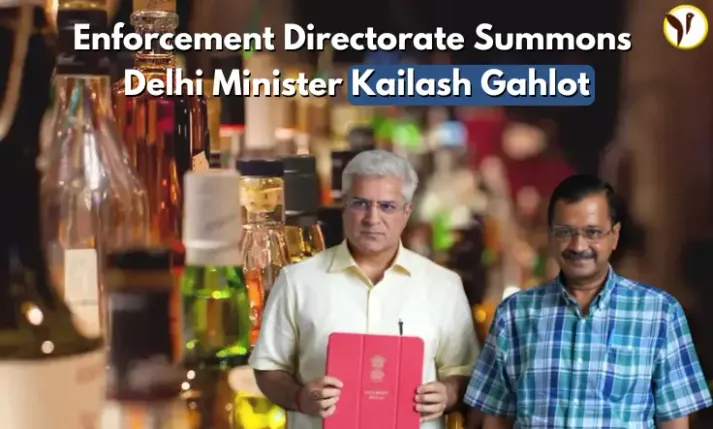The Enforcement Directorate (ED) has called Delhi's Transport Minister and AAP leader Kailash Gahlot for questioning in relation to a money-laundering investigation linked to the liquor policy issue, in light of Chief Minister Arvind Kejriwal's recent arrest. It has been requested that Gahlot, a 49-year-old, make his initial appearance before the agency.
The state government's transportation, housing, and legal portfolios are among those held by Kailash Gahlot, a Delhi lawmaker who represents the Najafgarh section. According to PTI, he has been told to show up at the ED today.
This summons is the latest in a string of comparable moves against AAP leaders; notable individuals including Manish Sisodia, Sanjay Singh, and Arvind Kejriwal are already detained on related allegations. Remarkably, among the notable AAP members who have not been arrested in this matter are Kailash Gahlot, Atishi, and Saurabh Bharadwaj.
The Delhi political scene has been more intense after Arvind Kejriwal was arrested on March 21, just after the Delhi High Court decided not to protect him from arrest over the excise policy. After rejecting nine summonses from the Enforcement Directorate in the past, Kejriwal is now under pressure from rival parties, especially the Bharatiya Janata Party, which has been calling for his resignation on moral grounds.
Kejriwal, who is presently being held by the Enforcement Directorate, has vigorously defended himself in court in response to these events. He has maintained that there is not enough evidence to support his detention and said that a false narrative about AAP corruption is being spread.
Sunita Kejriwal, the wife of the Chief Minister who is currently in custody, has started a WhatsApp campaign called "Kejriwal ko Aashirwad" in which she is pleading with followers to offer their blessings and support for her husband.
The current situation not only highlights Delhi's heightened political tensions but also poses important queries regarding accountability and governance in the nation's capital. The implications of these events are set to ripple across politics, influencing the conversation in the political sphere as the investigations deepen and the legal disputes get more intense.
Back in the spotlight is the AAP government's stay in Delhi and how it handled important policy issues, thanks to the continuing inquiry into the liquor policy case. The seriousness of the charges and the necessity of an open and honest investigation are highlighted by the involvement of high-ranking officials like Kailash Gahlot.
An already unstable political climate in the nation's capital is further complicated by the ED's call of Gahlot. The opposition is calling for accountability while prominent AAP officials are under legal inquiry, so it's unclear what will happen next.
The effectiveness of government and the moral character of political leaders are questioned in the midst of these events. One cannot stress how important it is for a democratic society to have responsibility, transparency, and respect for the law.
The results of these inquiries and court cases will be followed keenly by the country and will have a significant impact on the political climate in Delhi and abroad in addition to the persons concerned.







